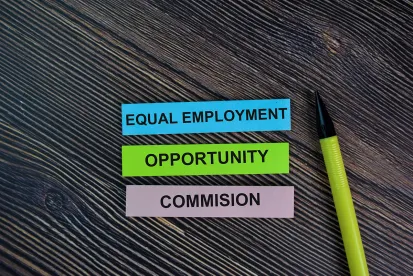On May 15, 2023, the Equal Employment Opportunity Commission (“EEOC”) updated its COVID-19-related technical guidance in response to the Biden administration’s termination of the COVID-19 public health emergency on May 11, 2023. The updated guidance cautions employers about their continuing obligations under the Americans With Disabilities Act (“ADA”), the Rehabilitation Act, and other equal employment opportunity laws.
The EEOC has periodically updated its technical guidance since the beginning of the COVID-19 pandemic to address reasonable accommodations, temperature screenings, vaccine requirements, and other issues. In its most recent update, the EEOC warned employers that the termination of the public health emergency does not expressly authorize the termination of reasonable pandemic-related accommodations granted to employees.
Specifically, the guidance provides that employers may not automatically strip employees of reasonable pandemic-related accommodations without first engaging in an interactive process. For example, employers may have provided remote work accommodations or hybrid work schedules that they wish to re-visit in light of the end of the public health emergency. Employers seeking to relieve their obligations to provide certain accommodations brought about by the COVID-19 pandemic should engage with employees to determine whether those accommodations remain necessary and consider each employee’s individual medical circumstances in rendering such determination. As part of this process, employers may request supporting documentation to clarify the continued need for accommodations and to determine whether alternative accommodations may be appropriate.
Additionally, the EEOC’s guidance recognizes that “long COVID” or “post-COVID conditions”—which may result in fatigue, brain fog, headaches, breathing difficulties, and other symptoms—continue to affect employees and remain enforcement focuses of the EEOC. An individual affected by these conditions, the guidance informs, may be considered to be covered by the ADA. The EEOC’s guidance provides several examples of the types of accommodations that may be provided for employees suffering from long COVID, including quiet workspaces, noise canceling headphones, and uninterrupted work time to address brain fog.
The EEOC’s guidance did not address the continued legality of COVID-19 vaccination requirements in light of the expiration of the public health emergency. As a general matter, employers should be permitted to maintain vaccine requirements if they are job-related and consistent with business necessity, and if they engage in an interactive process with employees seeking reasonable accommodations to a vaccination requirement. Notably, the Supreme Court heard oral argument in April 2023 regarding the “undue burden” standard for religious accommodation requests under Title VII, so employers should be alert that the Court’s forthcoming decision may impact employers’ ability to deny accommodation requests based on an employee’s sincerely held religious beliefs. See Groff v. DeJoy, 143 S. Ct. 646 (2023).
Looking forward, the EEOC also suggested that employers should monitor and work to counteract workplace harassment related to COVID-19. The novel forms of harassment that may arise in the COVID-19 context could involve employees being harassed for taking certain safety precautions, such as wearing masks, for disability-related reasons, or for requesting accommodation regarding a vaccination requirement. Employers should treat these sorts of behaviors the same way they treat other forms of workplace harassment by both making proactive efforts to prevent them from occurring and promptly investigating allegations of any such incidents that may arise.
In light of the considerations addressed by the EEOC’s guidance, employers should proceed with caution as they look to adjust to the post-COVID-19 employment landscape. Employers will not be able to simply revert to pre-pandemic practices without facing potential liability, and they must be mindful of both continuing as well as prospective obligations arising under existing law in connection with pandemic-related matters.






 />i
/>i

